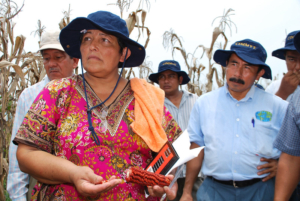IKEA’s Impact on Poverty in Oaxaca
 Oaxaca, a state in Mexico’s southeastern region, stands out as one of the country’s most impoverished areas. Combined with waning social challenges, complex demographics and highly mountainous geographical positions, Oaxaca in 2025 trails Guerro by 0.1% for the second neediest state in the nation. Moreover, with a gross domestic product (GDP) per capita of approximately $4,500, Oaxaca falls dramatically short of the national average, reaching only 44%. A staggering 66.4% of the population in Oaxaca lives below the national poverty line and 23.3% endure extreme poverty.
Oaxaca, a state in Mexico’s southeastern region, stands out as one of the country’s most impoverished areas. Combined with waning social challenges, complex demographics and highly mountainous geographical positions, Oaxaca in 2025 trails Guerro by 0.1% for the second neediest state in the nation. Moreover, with a gross domestic product (GDP) per capita of approximately $4,500, Oaxaca falls dramatically short of the national average, reaching only 44%. A staggering 66.4% of the population in Oaxaca lives below the national poverty line and 23.3% endure extreme poverty.
Compounding Oaxaca’s poverty are ineffective planning and investment systems. This, alongside the absence of a cohesive financial management operation, disadvantages the state’s ability to address the needs of its most vulnerable populations.
The Place of the Seed
Oaxaca is a vibrant region rich in cultural heritage, home to approximately 1.2 million Indigenous individuals. This state boasts the second-highest concentration of Indigenous residents in Mexico, reflecting a diverse tapestry of languages and traditions. In Oaxaca, people communicate in 23 distinct languages, each reflecting a unique identity and heritage, showcasing the region’s deep-rooted connection to its ancient past.
However, each year, a heartbreaking wave of Indigenous individuals departs from the hillside villages of Oaxaca, journeying to the United States (U.S.) in search of economic opportunities. Also, they aim to escape from a stifling political climate that obstructs progress in the region’s most impoverished rural areas.
This persistent lack of development compels natives to abandon their ancestral lands, leaving behind the homes and communities they cherish. In response to this pressing issue, IKEA has initiated initiatives to make a positive difference.
The IKEA Social Entrepreneurship Program
The IKEA Social Entrepreneurship program aims to foster positive social and economic change by partnering with social entrepreneurs and enterprises. Indeed, program initiatives involve supporting businesses that address social and environmental issues, providing jobs and offering unique products and services to IKEA customers. The program offers various forms of financial support, including grants, loans and investments, while focusing on scaling social businesses to drive economic reform and poverty reduction.
Supporting Economic Reform
IKEA Social Entrepreneurship has partnered with the World Wildlife Fund (WWF) to launch an innovative initiative called the Community Conservation program. This multifaceted approach aims to harmoniously blend environmental conservation, sustainable agricultural practices and the promotion of dignified livelihoods.
Through collaboration, IKEA aims to cultivate a more sustainable future while amplifying marginalized voices within the Zapotec community. Such efforts focus on the vibrant Oaxaca region of Mexico, supporting the initiatives of 13 dedicated social entrepreneurs, six women-led, deeply committed to fostering sustainability and community well-being.
Some of these social enterprises include Águilas en el Maguey, a cooperative of 10 Zapotec women dedicated to cultivating high-quality Mezcal agave; Alternativa Agrícola Suchixtepec, an organic farm specializing in the raising and sale of rabbits; and Emprendedoras de Tierra Blanca, a collective of Zapotec women producing organic vanilla and coffee.
Long-Term Impact
IKEA committed to a transformative three-year partnership to benefit 1,500 individuals in Mexico. The partnership prioritizes the Indigenous Zapotec community, who depend on the land for their livelihoods. By bolstering the 13 enterprises, Oaxaca can utilize sustainable practices to abolish poverty, including efficient production methods, optimized commercialization strategies, innovative product design and greater market access.
Additionally, the Community Conservation program will foster sustainable economic growth and actively empower women and youth by integrating them into governance and decision-making processes. Ultimately, this approach seeks to create a lasting financial impact on the community, promoting greater autonomy and resilience among its members.
Final Thoughts
IKEA’s community conservation enterprises (CCEs) actively deliver ongoing economic benefits while also advancing conservation efforts that help alleviate Oaxaca’s poverty. These enterprises create new job opportunities that invigorate the local economy by seamlessly blending sustainable ecosystem practices with agricultural initiatives.
Utilizing a holistic approach not only enhances the quality of life in Oaxaca but also significantly reduces poverty levels. Furthermore, this in turn curbs migration among the Oaxacan population. Similarly, through individual efforts, CCEs preserve the natural environment and extend support to impoverished communities.
In totality, the Community Conservation program will help protect Oaxaca’s rich natural heritage, empowering local communities with resilient economic opportunities that respect people and the planet.
– Marcus Villagomez
Marcus is based in Galveston, TX, USA and focuses on Business and New Markets for The Borgen Project.
Photo: Flickr
